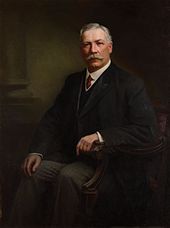Alexander Cameron Rutherford
Alexander Cameron Rutherford , KC (born February 2, 1857 in Osgoode (now part of Ottawa ), † June 11, 1941 in Edmonton ) was a Canadian politician . From September 2, 1905 to May 26, 1910, he was the first Prime Minister of the newly created province of Alberta and chairman of the Alberta Liberal Party, which he co-founded . Rutherford is known as the "Architect of the Province" and is also the founder of the University of Alberta .
Study and job
Rutherford grew up on a farm near Osgoode. He attended local elementary school and the Canadian Literary Institute, a Baptist- run middle school in Woodstock . In 1881 he completed his studies of civil law at McGill University in Montreal from. He was admitted to the Ontario bar in 1885 and was a junior partner with Hodgkins, Kidd, and Rutherford for ten years . In 1888 he married Mathilda Birkett, the couple had a son and two daughters.
In 1895, a year after Rutherford had been in Edmonton on business , he and his family settled there. In the city of Strathcona (incorporated into Edmonton in 1912), which was then in the Alberta District of the Northwest Territories , he founded his own law firm. From 1896 he held various public offices at local and regional level. In 1902 he was elected to the Legislative Assembly of the Northwest Territories . In 1905 he was one of the founding members of the Alberta Liberal Party .
prime minister
Lieutenant Governor George Bulyea appointed Rutherford Prime Minister on September 2, 1905, the day after Alberta was founded. In the first elections to the Alberta Legislative Assembly on November 9, 1905, the Liberals received a clear absolute majority. Rutherford also served as Minister of Finance and Education. His government was mainly occupied with expanding the provincial infrastructure in order to cope with the heavy immigration. In 1906, the state-owned telephone company Alberta Government Telephones was founded ( privatized as Telus in 1990 ).
Rutherford was particularly interested in the rapid expansion of the educational system. In 1906 he initiated the legislative process that led to the establishment of the University of Alberta two years later . He personally chose the location of the university in his home town of Strathcona. In the elections in March 1909, the Liberals were able to increase their share of the vote.
While Rutherford was popular, he and his cabinet were forced to resign on May 26, 1910, after allegations were made that he was incompetent and involved in a conflict of interest . The government fell apart after Rutherford made the controversial decision to provide a state guarantee to bonds of railway companies (particularly the Alberta and Great Waterways Railway ).
further activities
In court, Rutherford was acquitted of all charges. Disappointed, he turned away from the Liberals and identified more and more with the Conservatives. In the April 1913 elections he lost his seat in the legislative assembly. Rutherford returned to his law firm and served on the boards of various companies. In 1921 he ran for a seat in the Canadian House of Commons unsuccessfully on the side of the Conservative Party .
Rutherford was Chancellor of the University of Alberta from 1927 until his death. In 1931 he received an honorary doctorate from McGill University. The library of the University of Alberta and Mount Rutherford in Jasper National Park are named after him . His extensive collection of books on Canadian subjects now forms an important part of the university library.
Web links
- Alexander Cameron Rutherford ( English, French ) In: The Canadian Encyclopedia .
- Biography on the Alberta Legislative Assembly website
| personal data | |
|---|---|
| SURNAME | Rutherford, Alexander Cameron |
| BRIEF DESCRIPTION | Canadian politician |
| DATE OF BIRTH | February 2, 1857 |
| PLACE OF BIRTH | Osgoode |
| DATE OF DEATH | June 11, 1941 |
| Place of death | Edmonton |
